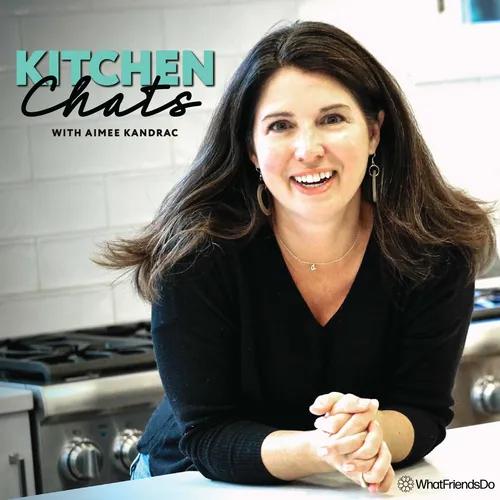Kitchen Chats with Aimee Kandrac Episode 8: How To Help A Family With Special Needs
- Author
- Aimee Kandrac
- Published
- Thu 08 Dec 2022
- Episode Link
- https://sites.libsyn.com/446388/kitchen-chats-with-aimee-kandrac-episode-8-how-to-help-a-family-with-special-needs
Life-changing events can be a regular occurrence and especially challenging for families that have someone with special needs, something that Jen DeMotte knows first-hand as the parent of a child with special needs and autism. On the episode, Aimee chats with Jen about some of the most helpful things other people have done for her family during difficult circumstances. Jen also gets real about some of the challenges of being a parent to a child with special needs as well as the moments of joy and connection.
Episode Highlights
Special needs families may be reluctant to accept help.
If a family has a member with special needs, their daily life will be very specialized and likely incredibly different from yours. Oftentimes, people with special needs struggle with changes to their routines and have unique health needs that can make it difficult for families to accept help.
“How we live life is so different and specialized,” Jen said. “A lot of times when folks offer to help it’s difficult for me to accept.”
If you do want to help a family with special needs, Jen recommends directly asking what you can do to help. Suggestions include:
- Doing the laundry
- Buying a Costco-size version of a favorite snack (with approval)
- Sitting with a caregiver while they make insurance calls
- Carpooling other family members to places they need to go
Don’t judge.
The home of a person with special needs is often one of their only safe places in the world where they are loved and accepted unconditionally. So if you’re helping someone with special needs -- especially in their home -- make sure you’re respecting that safe, judgment-free space. You also should stick to routines and follow instructions given by parents and caregivers even if you don’t understand why things must be done in a particular way.
“It is hard when someone comes into our house and says, Why don’t you just do this?’” Jen said. “Because it doesn’t work. Everything we do is different.”
Be ready for anything.
Offering to help a person with special needs means being prepared to help with tasks you may find weird. For instance, when Jen was potty training her then-8-year-old daughter, therapists recommended that her daughter not wear pants around the house, so she could understand what was happening. While the technique may sound odd to outsiders, it worked, and even years later, Jen is grateful to people who helped her family during that time.
“You just need one person to be like, ‘Just tell me what you’re doing, and I will do it, and you can take a breath,’” Jen said.
Sometimes the best help is just to listen.
Daily life can sometimes be challenging for parents of a child with special needs, and the best thing you can do is just to sit and listen. That can mean comforting a parent if they need to vent or celebrating a milestone, even if it looks different than you might expect.
“I love our life, but sometimes life is really hard,” Jen said. “There’s joy in those kitchen counter moments where some says, ‘Just tell me about your day. What happened?’”
Resources + Links
- Aimee Kandrac: Website, Facebook, Twitter, LinkedIn
- WhatFriendsDo: Website, Instagram, Facebook, Twitter, LinkedIn
About Aimee and WhatFriendsDo
Aimee Kandrac is a speaker, consultant, and the co-founder and CEO of WhatFriendsDo. Her work is instrumental for organizing support during life-changing events, and she speaks to organizations about creative ways to help friends and family during times of crisis. Aimee has been recognized as a Top 50 Mompreneur by Babble.com and is the first female CEO in the state of Indiana to close a $500,000 funding round. She has been featured in Forbes, Time, the LA Times, Oprah.com, the Indianapolis Star, and more.
WhatFriendsDo is a simpler way to create organized and actionable support during a time of crisis. The free, online platform empowers healthcare facilities, HR departments, families, and friends to easily coordinate meals, errands, transportation, childcare, communication, and more for those in the midst of a life-changing event. The women-founded and women-led company started as a solution for a friend with terminal cancer. WhatFriendsDo is based out of Indianapolis.
